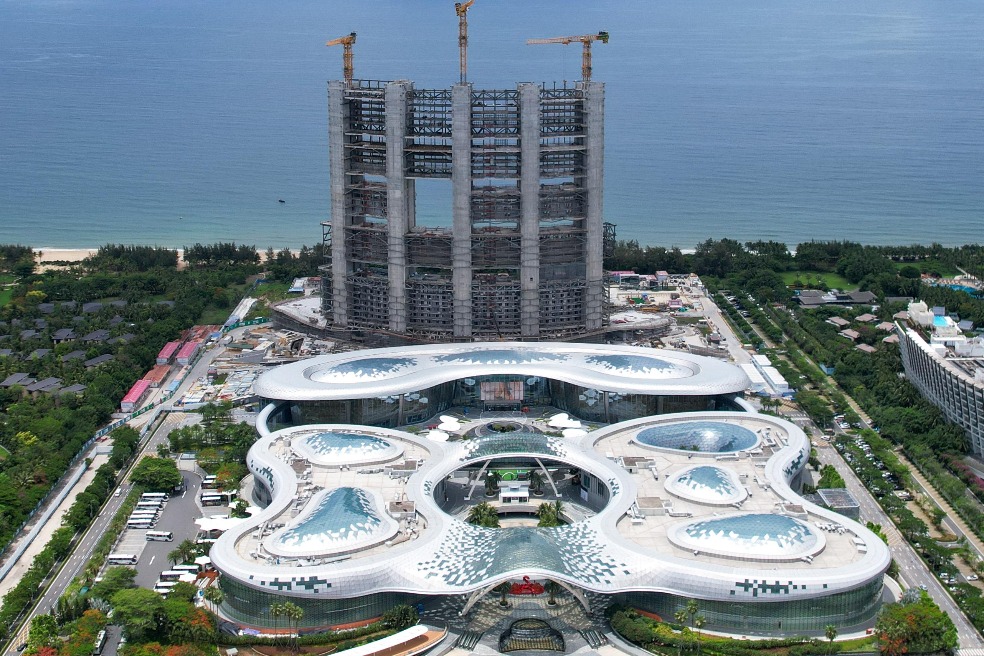New HPV vaccine to boost access to jabs

China's newly approved and domestically developed 9-valent human papillomavirus vaccine is expected to give potential recipients more access to the cancer-preventing shot. This makes China the second country, besides the United States, capable of independently producing the high-valence vaccine, health experts said.
Xiamen Innovax Biotech in Fujian province announced earlier this month that its 9-valent HPV vaccine gained approval to go to market.
There are currently three types of HPV vaccines available in China — bivalent, quadrivalent and 9-valent. Until now, only US pharmaceutical company Merck & Co, known as MSD outside the US and Canada, manufactured the 9-valent version, sold under the brand name Gardasil 9.
Innovax's new product differs slightly in dosage requirements. While the imported version requires two doses for individuals ages 9 to 14 and three for those ages 15 to 45, the new vaccine recommends two doses for ages 9 to 17 and three for ages 18 to 45. That means girls ages 15 to 17 receiving the domestic vaccine can reduce the number of required shots by one, cutting overall vaccination costs.
Although the Xiamen company's 9-valent HPV vaccine has not yet entered the market and its price has not been made public, cities including Chongqing, Xi'an in Shaanxi province and Guangzhou in Guangdong province have begun offering discounts on the imported vaccine in anticipation of increased supply.
The imported 9-valent vaccine, which costs 1,300 yuan ($181) per dose, remains in short supply. A Shanghai resident surnamed Wang, who recently completed the three-shot regimen, said local clinics are offering the full series for the price of two doses — a discount of 1,300 yuan.
"With the new domestic vaccines boosting supply, more people will gain access to vaccination," said Chen Rong, director of gynecologic endocrinology and reproductive medicine at Peking Union Medical College Hospital. "If pricing can be balanced with corporate costs and include reasonable reductions, coverage could expand further."
However, she cautioned that domestic production does not necessarily mean lower prices.
"High-quality domestic products need not engage in price wars to compete," Chen said.
Vaccination rates in China remain relatively low. A study published by the Chinese Center for Disease Control and Prevention found that from 2018 to 2020, only 2.24 percent of girls and women ages 9 to 45 had received HPV vaccines. Among girls ages 9 to 14 — considered the most crucial age group — the rate was just under 2 percent. By the end of last year, coverage in the 9 to 45 age group had climbed to nearly 20 percent, with higher rates seen in more developed regions.
Globally, about 27 percent of women in the target age range received at least one HPV vaccine dose in 2023, according to the World Health Organization.
Low uptake in China is largely due to limited accessibility and awareness, Chen said. Vaccines are only available at designated facilities, many of which have long waiting times, she added.
Qiao Youlin, head of the Department of Cancer Epidemiology at the Chinese Academy of Medical Sciences, emphasized the importance of early immunization.
"For younger girls, antibody levels produced after vaccination are significantly higher than in adults," he said. "The earlier the vaccination, the stronger the immune response."
Su Jing, adjunct associate professor at Tsinghua University and secretary-general of the Global Health and Development Research Center, said public health awareness has grown since the COVID-19 pandemic, which may boost HPV vaccine acceptance.
"Unlike vaccines for infectious diseases, the HPV vaccine helps prevent certain types of cancer," Su said. "It has high value in health economics and the potential to become a 'star' vaccine."
She added that growing policy support, public awareness and market enthusiasm are creating favorable conditions for broader vaccine acceptance.
"In the future, whether imported or domestically produced, we'll likely see a flourishing vaccine landscape fueled by healthy competition," she said.
Li Yanfang, head of the obstetrics and gynecology department at Beijing Chaoyang Hospital, explained that the quadrivalent vaccine protects against four types of HPV and can prevent over 70 percent of cervical cancer cases. The 9-valent version offers protection against nine types, with efficacy exceeding 90 percent.
To expand access, many regions have launched free or subsidized vaccination programs for eligible populations.
China's first government-led free HPV vaccination initiative began in Ordos, Inner Mongolia autonomous region.
Other provincial-level regions, including Guangdong, Hainan, Jiangxi, Fujian, Xizang and Chongqing, have since rolled out similar campaigns.
Today's Top News
- What's behind Nvidia's charm offensive?
- Xi urges China and EU to strengthen bilateral relationship for a brighter future
- China's basic medical insurance covers 95% of population
- Summit seen as opportunity to strengthen ties
- China leads boldly in global energy transition
- NHS doctors in England to strike over pay






























